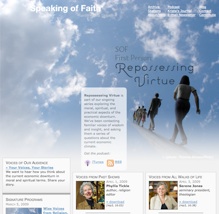The Voice of Virtue

Two and one-half centuries later this statement remains a profound truth.
Repossessing Virtue is part of ongoing series produced by Speaking of Faith exploring the moral, spiritual, and practical aspects of the economic downturn. We've been contacting familiar voices of wisdom and insight, and asking them a series of questions about the current economic climate.
Here is an excerpt from the journal of Krista Tippett as she reflects on her conversation with Parker Palmer.
As the indicators by which we've measured our collective well-being in recent years continued to plummet, I found a story of Parker Palmer echoing in my head. He and I spoke years ago about his mid-life experience of clinical depression, about which he has written searchingly and made rich sense in later life. He told me about a psychiatrist who helped him move to a new level of healing by asking him, "Could you begin to imagine your depression not as an enemy that is crushing you — but as a friend pressing you down to ground on which it is safe to stand?" His description of the unrealistically elevated heights of ego and freneticism that preceded his psychological depression — an unsustainable, inflated sense of what is normal — was startlingly analogous with our economic present.
And of the "economic terrors that now engulf us." Parker makes this plain but startling observation: "At some level most of us knew they were coming." We know that we can't live forever beyond our means, that unregulated greed cannot end well, that a cycle of prosperity that brings unparalleled wealth while simultaneously impoverishing an ever wider population will eventually yield to that imbalance. In recent years many of us have suspended this knowledge in favor of optimism and opportunities based on facts and figures — "the numbers," as my colleagues at Marketplace say — that presented themselves and that we have collectively accepted as a harder, surer reality.
The knowledge we need to reckon morally and spiritually with the place we're in now — the commonplace knowledge that might have shielded us from some of the human wreckage that is being wrought — comes, Parker Palmer says, "from a place deeper than our intellects." During a bull market, such talk might sound sentimental, fanciful, and irrelevant. Yet as the numbers betrayed us, the talk even among economists was of a loss of "faith" in the market. We are given to realize anew that even in the realm of commerce and finance — as in fact science has been detailing in biochemical terms for years — human emotion and desire shapes our most concrete endeavors. The emotion of greed, the emotion of fear, are some of the drivers we can discern behind the Narnia-like illusions behind hedge funds, subprime mortgages, and derivatives that we accepted, for a time, as the contour of solid economic reality.
This kind of truth telling — this correction, if you will — is sobering, but it is also good news. The numbers don't become irrelevant now, but we can see them more clearly, with their limits, and give due attention to other modes of analysis that complete and anchor our humanity. We can tap more seriously into the practical resources of vocabulary and practice that religious and spiritual traditions have mined for centuries. They offer language, as Parker Palmer displays this hour, that can invigorate and refresh our common reflection — thinking about abundance and scarcity in non-material terms, about violence and nonviolence in everyday life, and teachings about acknowledging fear but not being consumed and guided by it.
Here are four questions which focus the engagement of this
loving inquiry into our life together:
1. Are you experiencing this economic moment as a moral or spiritual crisis as well?
2. Do concepts of trust, of living in community, of what sustains you have relevance in new tangible ways as you face changed economic realities?
3. What qualities of human nature do you want to cultivate in yourself or your children?
-
4. Who will we be for each other?

Servant-Leader Associates 510 Westminster Avenue Swarthmore, PA 19081
610.544.1031 servantleader1 at me.com
